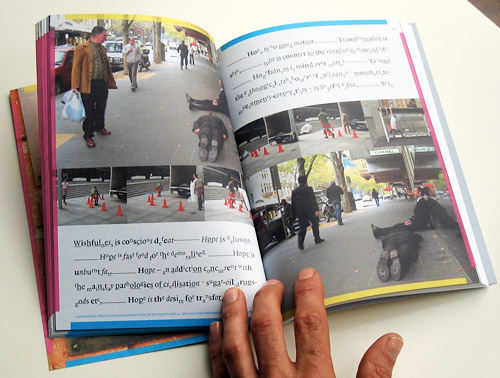You talk about in your 'How to do Words with Things' about city based artists feeding off their own disconnection/abstraction in order to do their art (I would have to check up on that); their angst becomes generative of the work itself, and because everyone in the city has this disconnection there is a good market for this kind of work. Consumers buy the art in order to express their solidarity with disconnection and consumption. Your play in the city (along with an interest in graffiti, tagging, fonting!), to me, expresses a critique of those kind of artistic practices. That is, an art practice not built around consumption, one that is decapitalised. You propose an exchange, or gift-ecology. (The idea of a gift-economy began with Marcel Mauss, an anthropologist writing in the late 1920s after the destruction of Europe – through war and the industrial revolution – and wanting to rediscover a point of human connection without economic and industrial subterfuge. His book, 'The Gift', is a rather interesting critique of capitalism). I digress, back to my long-winded point. So you are interested in an art practice that generates responsibilities, obligations, debts, counter-gifts that keep a cycle of exchange going, that connects and keeps us in play with each other. (Another side point, the word for gift in German 'Gib' is the same word as poison - i.e. the gift is not 'free' but indebts us to give back, which is not necessarily a bad thing. The gift; antidote and poison! Also the English derivative of gift comes from the same word as 'take': the gift economy is one where we give and take; by giving we take something from the other - we take their sense of debt so that they give back!).
Perhaps all I want to say is that a truly decapitalised practice would have nothing to do with the city; would have no play with its structures, because this is what gives and takes our (creative) energy. I love a good ideas stoush; this shows my terrible reliance on critique (this is what the university teaches). I retreat from creativity through the self-defense of critique - now there is another provocation... PJ, I might add, I find your work terribly hopeful and evocative of a post-industrial future. Please keep sharing and indebting us all in a gift-ecology.
Thursday, November 20, 2008
Hamish's gift
Response to my Tagged post by Hamish Morgan.
Subscribe to:
Post Comments (Atom)

1 comment:
"power invents a mask for powerlessness to wear" Toby Sime
Thank you so much Hamish! Maybe the blogasphere is not merely just a cheap version of the mainstream media – 'the shopping guides' in McKenzie Wark's words. So good to get your thoughts.
There are so many things to respond to, but i'm going to keep it brief for now.
Firstly, I take your point about the city. That is why I call my thought and my art 'transitional'. This transitional phase is self-determined, and belongs to a sea of folk with like ideas. The hopefulness found in my work is the utopian conjuring of a post-industrial, ecological revolution. The hopelessness is the understanding that this will not occur without a crash because the civilised, mediated twenty-first century human is a hopeful, globalised and compromised unit of capitalism.
My idea of, or rather interest in, hope and hopelessness is influenced by Eastern philosophy. Hopefulness is the acceptance of powerlessness. Hope is generally organised or encouraged by some hierarchy or another. Hopelessness is therefore non-delusional, and by extension, to my mind at least, not a negative position.
In real terms, as an Anglo-European occupying DjaDja wurrung land with the questionable license-to-do-so of a global-pool-of-money bank mortgage, digging over the soil, improving the humus and beginning to understand the nuances and complexities of the ecology that supports us is, so far, all that I've come up with.
pj
Post a Comment